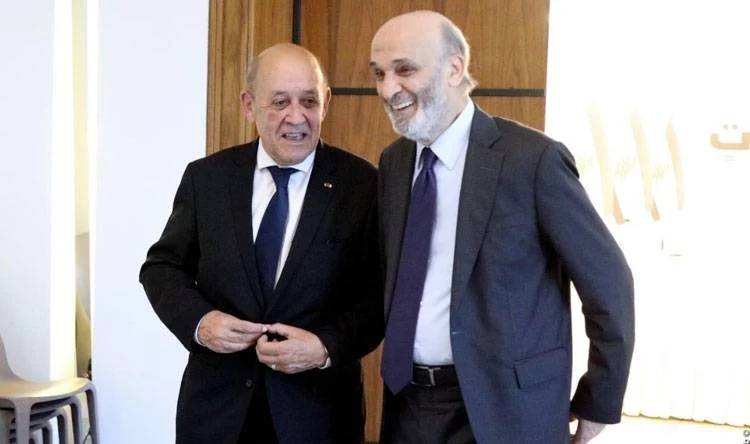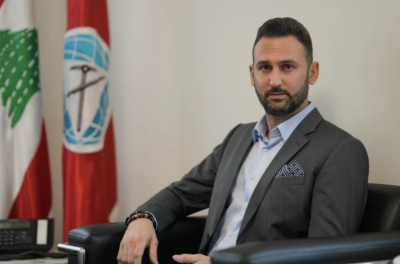
French envoy to Lebanon Jean-Yves Le Drian was received by Lebanese Forces chief Samir Geagea in Meerab on 26 July. (Credit: LF website)
“I am a facilitator commissioned by the group of five”: with these remarks the French president Emmanuel Macron’s special envoy for Lebanon summed up the second episode of his mission to uncover a path out of the presidential deadlock in the country.
While the local actors seem to have stood their ground, the diplomat has not yet admitted defeat. Aware that any solution in Lebanon necessarily involves a wide understanding, he returned to Beirut with an amended version of the solution he proposed a month ago and which the group of five [France, the United States, Saudi Arabia, Egypt, Qatar], which gathered nearly 10 days ago in Doha, rejected.
Instead of championing a broader dialogue on controversial issues, Jean-Yves Le Drian is now advocating for consultations that would exclusively focus on the future president, his profile and his program. These consultations would be held in September and be followed by successive electoral sessions, unless things do not go as expected.
Le Brian arrived in Beirut on Tuesday afternoon, nine days following the last meeting of the group of five representatives in Doha on July 17. The statement issued at the end of this meeting made no mention of an expanded dialogue to facilitate the election of the new president — a French proposal rejected by the four other members of the group. A plan B was therefore needed.
At the Doha meeting, Le Drian was able to see the weariness of [France’s] partners regarding the Lebanese file, but he managed to get support for his approach,” an informed source told L’Orient-Le Jour. “But this commission is not time unlimited.”
The source added, “Le Drian should organize in September a kind of political exercise mainly focused on the profile and priorities of the future president. The French do not like to use the term ‘dialogue’ in order to avoid a misinterpretation of the process.”
One must therefore understand that these consultations will not focus on the current political system or the national defense strategy. It is not about a broader dialogue advocated by Paris — an approach supported by Hezbollah and its allies, and rejected by the opposition, especially Christians.
It is on this point, the matter of naming a presidential candidate, that Le Drian’s discussions in Beirut have been focused. He began his contacts on Tuesday evening with the leader of the Socialist Progressive Party Taymour Jumblatt, the leader of Kataeb Samy Gemayel, and Zgharta MP and former opposition candidate to the presidency Michel Moawad.
“He has laid out a road map to pave the way for consultations that would exclusively focus on the profile of the next president and his program, which would take place in September,” an opposition MP who declined to be named told L’Orient-Le Jour.
“At this stage, the French envoy is therefore looking for points of convergence in order to pave the way for these consultations that would be followed by successive sessions to elect [a president],” the MP added.
“The consultations that would be held in September would not tackle the name of the future prime minister or the next army chief. So it’s no longer about a package deal,” the MP said.
Hence, the MP insinuated that Paris seems to have finally turned the page on the previous package deal that provides for the election of Hezbollah’s and Amal’s preferred candidate, Marada leader Sleiman Frangieh, as president, and for the appointment of judge and diplomat Nawaf Salam, who gravitates in the orbit of the opposition, as prime minister.
Turning the page on Frangieh
Similarly, the Lebanese Forces (LF) believe France has relegated to the past the Frangieh-Salam proposal. “During Jean-Yves Le Drian’s meeting Wednesday with [LF leader] Samir Geagea, Le Drian did not mention this equation. It is no longer on the table,” said MP Pierre Bou Assi, (LF/Baabda), who attended the meeting.
“The discussions focused primarily on the characteristics and priorities of the future president,” he said.
“While we perceive the French efforts in good light, we have not yet said our last word about the meeting in September,” said Bou Assi. Geagea himself raised this point in a conversation with journalists after the meeting.
“We will discuss it with the LF board and our friends in the opposition,” the party leader said. In taking this approach, Geagea joins Gemayel and Moawad who have not given a final answer to the French envoy.
But why would the anti-Hezbollah parties — who have so far refused any dialogue on the presidential election — change their position today?
“It is no longer a question of a larger package deal. The only item on the agenda is the presidential election. Otherwise, we would have refused the proposal from the outset,” said the opposition MP. He added that the option of Jihad Azour, the opposition’s and the Free Patriotic Movement (FPM)’s preferred candidate, is still on the table for this camp. “And it is in this spirit that we will go to the meetings in September,” he added.
Le Drian also met with FPM leader Gebran Bassil on Wednesday in the presence of MP Nada Boustani (FPM/Kesrouan). The FPM said in a press release that a positive atmosphere prevailed at the meeting, and the party leader expressed “openness” to Le Drian’s new proposal — a position that came as no surprise, with Bassil boasting that Paris has turned the page on Frangieh and is now adopting, in his view, the FPM approach to the issue.
Since September 2022, the FPM has been calling for agreement on the broad outlines of Michel Aoun’s successor’s program.
While both the opposition and the FPM welcomed the change in the French approach, the reaction was reportedly different in Ain al-Tineh. L’Orient-Le Jour learned from a source close to Parliament Speaker Nabih Berri that Le Drian suggested that Berri hold a broader dialogue that would lead to an agreement on a consensus candidate, without ruling out the idea of a package deal [that would include the name of the prime minister and other appointments].
This would explain Berri’s remarks to the al-Hurra TV channel, in which he referred to “a breach in the wall of the presidential election.”
The same source added that Le Drian did not see an objection to the candidacy of army chief Joseph Aoun — a serious candidate for the presidency who is categorically opposed by Bassil.
Le Drian also held talks on Wednesday with Frangieh; the Sunni MPs of the National Moderation bloc, formerly affiliated with the Future Movement; the Sunni MP close to the March camp, Faisal Karami; and Forces of Change MPs.
On Thursday, Le Drian is expected to meet with Tashnag and Hezbollah, before scheduling a meeting with the Lebanese and his international partners in the group of five in September.
This article was originally published in French in L'Orient-Le Jour. Translation by Joelle El Khoury.
